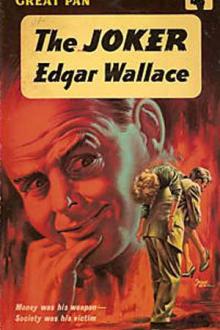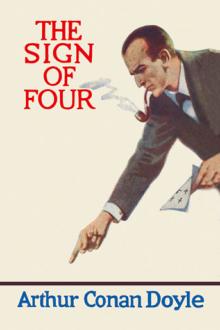The Joker - Edgar Wallace (good book club books TXT) 📗

- Author: Edgar Wallace
- Performer: -
Book online «The Joker - Edgar Wallace (good book club books TXT) 📗». Author Edgar Wallace
keep him away. If anything, he was proud of his accomplishments, for by
his fantastic twist of reasoning he had come to regard himself as a
public benefactor.
Nobody had seen him; even the comrades whom it was his joy to address in
frowsy Soho halls had not been honoured by speech or presence.
‘It almost looks as if he had gone over to the capitalists,’ said one.
‘I didn’t notice the flags were flying in Piccadilly,’ said Jim.
One night it happened that he found himself walking along the street at
the back of Fotheringay Mansions and, looking up, noticed a bright light
burning behind the green blind in an upper room. Mr Ingle’s apartment
was easily located. There was a narrow parapet to identify the height;
the lumber room where the light showed was four windows from the fire
escape.
Elk was with him, and to that unenthusiastic man he confided his
intentions.
‘He’ll start a squeal about police persecution,’ suggested Elk.
Undeterred, Jim went up in the elevator, though the man in charge
discouraged him.
‘I don’t think Mr Jackson is at home,’ he said. ‘A gentleman called an
hour ago and knocked twice but could get no answer.’
‘Maybe I can knock louder,’ suggested Jim.
But ring and knock as he did, he had no answer. Yet, as he listened at
the letterbox aperture, to make certain that the bell was ringing, he
could have sworn he heard a stealthy footstep inside. Why was Ingle
hiding?
There was, of course, the possibility that the man was engaged in some
new piece of roguery. But from his experience of swindlers, Jim Carlton
knew that they were never furtive when they were planning a coup.
The landing was deserted and he could wait without attracting to himself
the suspicion of the lift man. Again he stooped and listened; and now he
heard a sound which puzzled him-a rapid whirring. He had heard that noise
before somewhere, and yet he could not locate or diagnose the sound. It
came very faintly as through a closed door…
He saw the ascending light of the elevator and walked to the gate. The
car passed to the next floor to discharge its passenger, and then came
down to his level.
‘Couldn’t make him hear, I suppose, sir?’ asked the elevator man, with
the satisfaction of one whose dire prophecy has been realised. ‘He won’t
see anybody these days. Why, he doesn’t even come out for his meals.’
‘He has a servant, hasn’t he?’
‘Not now,’ said the lift-man gloomily, as they sank slowly down the well.
‘Used to have, but she—’ He told the story of Mrs Gibbins. ‘Now he gets
his food and stuff delivered. I think Mr Jackson is going in for
something unusual,’ he added as they reached the ground floor and he
pulled back the gates.
‘What do you mean by “something unusual”?’
The man scratched his head.
‘I don’t know exactly. About four days ago a man came here with a long
black box—the sort of thing that they use for carrying films—’
Films! Now Jim Carlton understood. This was the sound he had heard: the
whirr of a cine projector!
‘He took it up and left it. I asked him if Mr Jackson was taking on film
work, but he said nothing—the man who brought it, I mean. Of course, if
I knew for certain that he had any celluloid stored on the premises, I’d
have to report it. Fire risk… ‘
Jim listened without hearing. He was dumbfounded by the discovery. Every
man has his secret weakness, but though he had credited Mr Arthur Ingle
with many peculiarities, he had never suspected him of a passion for the
cinema.
Elk was waiting outside, the stub of a cigar between his teeth, a large
unfurled umbrella in his hand, and in a few words Jim told him what he
had learnt.
‘Pitchers!’ said Elk, shaking his head. ‘Never thought he would lower
himself to that! Queer thing how these crooks sort of run to weakness one
way or the other. I knew a man, the cleverest safe-breaker in Europe,
who’d risk a lagging to get a game of ping-pong! There was another fellow
named Moses who had the finest long-firm business in England—’
‘Let us go round and look at the back of the house again,’ Jim
interrupted the reminiscences ruthlessly.
The bright light was showing again, clear through the dark green blinds,
even as he looked it was extinguished, but when his eyes became
accustomed to the darkness he could see the reflected glow of another
light. It was in this room, then, that Mr Ingle was engaged in his new
hobby.
Jim looked naturally at the fire-escape. There was a wall to be scaled,
or easier perhaps, a door into the courtyard of the building might be
opened with one of his keys. But the door needed no forcing; it was
unlocked and gave easy entry to a stone-paved yard, whence a flight of
iron stairs led up to the roof. An iron bar was fastened across the rails
at the bottom, for what purpose was not clear, since it was possible to
get either over or beneath it.
‘Maybe it’s to keep it airtight,’ suggested Elk, ‘or to trip up the
fellers that are not burnt to death. Going up?’
Jim nodded, and Inspector Elk followed him from landing to landing until
they came level with the floor on which Mr Ingle’s flat was situated.
Without a word, Jim Carlton swung himself over the rail and, balancing
precariously upon the narrow ledge of stone, felt forward and gripped the
nearest window-sill. Progress in front of the windows was an easy matter
to one with his nerves: it was in the intervening spaces, where he had to
depend for his life upon a fine sense of balance, that the danger lay.
Elk watched him anxiously as he moved nearer and nearer to the window,
flattening himself against the wall and edging forward inch by inch; in
this perilous fashion, he came sidling to the window from behind which
came the ceaseless rattle of the projector.
The moment he reached his objective Jim knew that his effort had been in
vain. Behind blind and window he could see the small projector at work,
was dazzled by the flicker of the light, and Arthur Ingle showed clearly
in the glow thrown back from the invisible screen. He was staring at the
picture which he was projecting, and the first thing the detective
noticed was that Mr Ingle was in need of a barber, for his face was
covered by a ragged white stubble and his grey hair was long and unkempt.
But what was the picture he was viewing so intently? Jim screwed his head
round, but on the left-hand side of the window the blind ran flush with
the sash. There was nothing to but to make his way back and noiselessly
he edged towards the fire ladder.
He had not gone more than halfway before he had a shock. He felt a stone
yield beneath his feet, the edge broke off and fell into the courtyard
below. It might be one rotten piece, he argued, but stepped more
carefully. If the parapet gave under his weight while he was traversing a
wall space, nothing could save him from death; but he did not allow his
mind to dwell upon this aspect of the adventure.
He had reached the window nearest to the iron stairs and was feeling
cautiously along with his feet when, without warning, the narrow parapet
beneath him cracked. He managed to grip the wooden window; and in another
second was hanging with his legs in space. He heard Elk’s agitated
whisper, saw the elderly detective thrust up the crook of his umbrella,
but knew that this was beyond his reach.
There was only one hope; taking off his soft felt hat, he put his hand
inside and drove straight at the glass of the window. The shock of the
blow almost dislodged him, but clearing off the broken edge of glass, he
took a firm grip of the window-sash and drew himself up. A second pane
was broken in the same way and, reaching in, with some difficulty he
turned the window catch and pushed up the sash.
In another second he was in a room. He stopped to listen.
The smashing of the glass had evidently not aroused the inmates and he
passed out the news to the agitated Elk.
‘I don’t know whose flat it is,’ he whispered. ‘Meet me at the front of
the building.’
Tiptoeing across the room, he felt for the light and turned it on. He was
in a small bedroom, which had evidently not received any attention for a
very considerable time, for dust lay thick upon the furniture and upon
the folded blankets at the foot of the bed. Yet the room was handsomely
furnished and in a style that harmonised with the general furnishings of
Ingle’s apartment. Evidently this was one of the rooms which he had not
visited.
He opened the door carefully. The dining-hall was in darkness; from the
lumber-room came the ceaseless clickety-click of the projector.
Should he risk being discovered and satisfy his curiosity?
It was almost worth while. As he debated the point, the telephone rang
noisily in the dining-room and he drew back, pulling the door close. He
heard the snap as Ingle turned on the lights…
‘Hullo!—yes, Jackson… oh, is that you? Speaking from a call-box, I
hope? Good! Yes, everything is OK… Yes, I’ve heard him—but only on the
radio. I shall have to go to a meeting. He’s a good speaker? Huh! So am
I! A spell-binder—you can laugh! I’ve had four thousand people cheering
for two minutes. Don’t worry… no, thanks, I have all the money I need.’
The receiver thudded down and presently the lights went out and the
lumber-room door closed.
A spell-binder? Who was to be bound by the eloquence of Mr Arthur Ingle?
He waited until he heard the projector whirring again, and then,
tiptoeing across the room, reached the passage. He was sorely tempted to
take one look at the film show, but obviously he could only do this with
the certainty that he would be seen, and Jim had all a detective’s horror
of a ‘police persecution’ charge.
He turned his flashlight on the table: there might be something there
which would give him a clue. He saw a fat envelope bearing the name of
the Cunard Company. This had not been opened, but he could guess its
contents. Mr Ingle contemplated a visit to the United States—or Canada,
perhaps.
The turning of the projector ceased. He passed quickly to the hall,
opened the door and closed it quietly after him. The elevator was
ascending as he went down, and he was spared an explanation of his
surprising presence. He found the patient Elk flapping his hands to keep
warm and puffing at the last few centimetres of his cigar.
Fortunately Jim’s club was within a quarter of an hour’s walk and as
they crossed the park Elk asked:
‘You got into old man Ingle’s flat, didn’t you?’
‘Looks like it.’
‘What’s thrillin’ him?’ asked Elk. ‘I hate admittin’ it, but the cinema’s
my favourite sleepin’ place. Or was he runnin’ through the cartoons?’
‘I’d give a lot to know,’ said Jim, and repeated the conversation he had
overheard.
‘Never know whether Arthur’s red because he’s wild, or wild because he’s
red,’ mused Elk. ‘He’s a bit of a dilly-what’s





Comments (0)